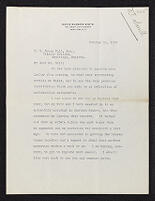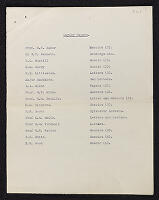501 West 130th Street, New York City. - Good to receive Ball's letter this morning, read his article on Euler, and to see 'the very generous contribution which you made to my collection of mathematical autographs' [items selected from the papers of Arthur Cayley]. Hoped to see Ball in England last year but he and his wife had a car accident in France from which his wife has still not recovered; is hoping to get to England next summer. His History of Elementary Mathematics should come out this winter; will ensure Ball gets a copy.
Many thanks for sending the autograph material; has 'several thousand autograph letters of mathematicians, about a thousand of them being from people really worth while'; has tried to secure this material, with 'a great deal of Orientalia' in mathematics, for future historians of the subject; intends to leave it to his university and have it catalogued. Postcript: has noted on the Cayley letters that they came to him 'through [Ball's] kindness'.


